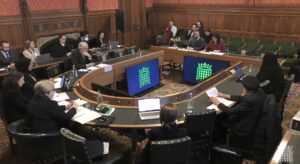Yesterday, I gave evidence to the Joint Committee on Human Rights.
I am approaching two years as Children’s Commissioner for England, and I have spent much of the last two years considering how best I can represent the millions of children growing up here.
For me, there are three core parts of my approach to advancing children’s rights which I want to set out.
Firstly, my approach is rooted in children’s experiences. The short version of my role is that I use the insight I gather from children’s experiences to improve their outcomes.
I began my tenure by launching The Big Ask – the largest ever survey of children. This garnered insights from more than 600,000 children in England, with a particular focus on the engaging the most vulnerable.
The insight provided by this informs all my work, but I wanted to explain to the Committee how it has specifically shaped my interpretation of two articles of the UNCRC:
This includes the right to education. What children told me in The Big Ask was that they were absolutely committed to education. They wanted to be back in school, but that they were often frustrated that their own ambitions were not reflected back to them by those around them, and they were not getting the support they needed to meet the demands placed on them.
This has fundamentally shaped my interpretation of what the right to education means.
And similarly on health. I cannot overstate the levels of concern around mental health amongst England’s children.
The NHS is currently under unprecedented pressure, and we’ve seen the real concern amongst people because they are worried the health care system might not be there for them if they need it.
What is clear speaking to children is that this has been their experience for several years. Children have seen their friends struggle without getting help and they do not have confidence the NHS will be there for them if they need to access care.
For me, the right to healthcare will not be realised until children in England believe the NHS will be there for them if they need help.
My annual data shows that some NHS areas are making incredible progress in improving children’s mental health services, but we need this to be everywhere before we can think children’s right to health care is being met.
The second thing I wanted to stress is that children’s rights need to be realised within their immediate environment. Yet, at a national level I find we obsess about relatively minor changes to policy without grappling with the much bigger question as to how significant policy changes are implemented. Whether it be school improvement, social care reform, the 2014 SEND changes, mental health improvement, the big issue for children is whether we can consistently deliver our promise so that all children can access the service they are entitled to.
For me, this is a core rights issue, because we cannot meet children’s rights unless our public services are of sufficiently quality to provide what children need.
This is also why I’m so focused on the ability of individual children to shape their care. The Committee will have seen the focus I have placed on children in care’s access to advocacy, and my desire to significantly scale up my own offer to children in the care system.
Children in care have the most proscribed rights in law, and yet these rights are often the least reflected in their experience. I am a big fan of the Children Act and I want to see a lot more focus on ensuring its promise is met for every child in care.
Finally, I would say that as Children’s Commissioner I think a focus on family is vital to realising the focus on children I want to see across Government. There has sometimes been a fear that children’s rights are being asserted over family rights. Clearly, there are cases in the child protection system where we have to focus on the child, but family is the prism through which children experience the world, we have to work with families and to focus on them if we want to make child-friendly policy. This is perhaps most obvious in relation to poverty. If we want to address child poverty we need to fundamentally refocus the system on families with children.






